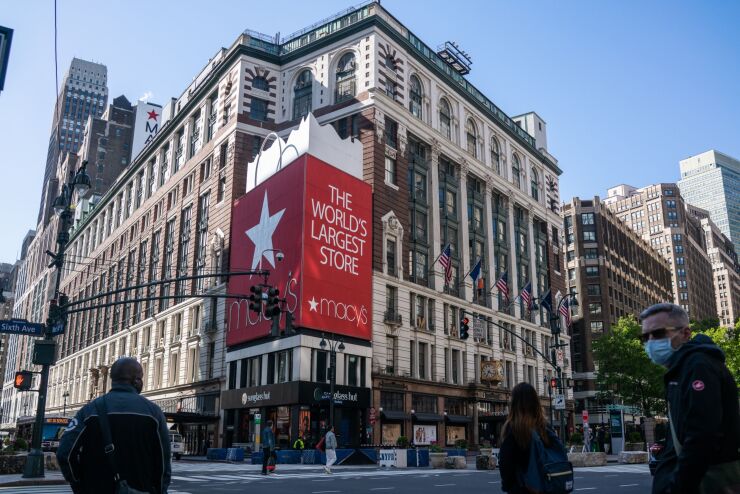Macy’s Inc. is putting some of its top stores as well as its inventory in hock to borrow as much as $4.1 billion, the latest retailer to seek financing after the Covid-19 pandemic walloped sales.
The company is looking to sell $1.1 billion of junk bonds secured by marquee properties including its State Street store in Chicago, according to a statement Tuesday. Bloomberg reported last month that the company was exploring ways to use its real estate to get financing, noting that the Herald Square property in Manhattan wouldn’t be included.
The retailer is also setting up a line of credit worth about $3 billion, backed by its unsold goods. Macy’s will probably need to borrow under it this year to make up for cash shortfalls, bond grader Moody’s Investors Service wrote in a note on Tuesday.
The new debt will buy Macy’s more time to turn itself around, while leaving it with fewer assets to borrow against in the future. Moody’s, S&P Global Ratings and Fitch Ratings all cut the company’s unsecured credit grades on Tuesday, citing the extra debt Macy’s is taking on.
Macy’s still has remaining real estate assets that it could borrow against if needed, including its flagship store in New York’s Herald Square, which it could mortgage, management said on an investor call, according to people familiar with the matter. The company could also use real estate assets to secure more junk bonds as well, they added.
The retailer is assessing what interest rate investors would be willing to accept on the notes it is selling this week, according to people with knowledge of the matter. The company is preliminarily discussing a yield in the high 8% area, the people said, asking not to be named discussing a private transaction.
A representative for Credit Suisse Group AG, which is leading the deal, declined to comment. A representative for Macy’s declined to comment beyond the company’s press statement.

Pre-Pandemic Struggle
The bonds that Macy’s is selling are backed by three urban stores, including the Chicago location, one on Fulton Street in Brooklyn, and another in Union Square, San Francisco. The notes are also backed by 35 other stores and 10 distribution centers, the company said in a filing. The assets are estimated to be worth around $2.2 billion assuming the properties are open and operating, the retailer said.
The company is borrowing to get it through a difficult period. Macy’s said last week that sales for the three months ended in February probably fell around 45% from the same period a year earlier. Other retailers, including Nordstrom Inc. and Gap Inc. have also recently borrowed against their properties to compensate for plunging revenue.
Like many of its peers, Macy’s was grappling with a shift away from brick-and-mortar stores before the pandemic made things worse. In February, the company embarked on a new three-year turnaround that includes eliminating 2,000 jobs and closing 125 of its least-productive stores -- or almost a quarter of its total locations.
On May 7, Macy’s said it would delay its quarterly earnings report due to “significant disruptions” in its operations from the outbreak of the new coronavirus. Macy’s had $1.5 billion of cash and cash equivalents at the end of February, according to preliminary results released last week, and borrowing against real estate would give the company more of a cushion, Bloomberg Intelligence said in a report.
More Liquidity
The new bonds, along with cash on hand, will repay Macy’s existing line of credit, which is $1.5 billion, unsecured and fully tapped out. The retailer lost its investment-grade status earlier this year, which typically spurs companies to switch their unsecured lines of credit into secured ones.
Following the borrowing, Macy’s total liquidity, including available credit, will be about $4.1 billion, the people said. About $1.1 billion of that is cash, they said. The notes are contingent upon the closing of the new line of credit.
Some of Macy’s bonds trade at distressed levels, with its 3.625% notes due 2024 changing hands for around 70 cents on the dollar.
Last month, Bloomberg reported that insurance companies that guarantee vendors get paid are now refusing to write policies covering Macy’s and other chains once considered sterling credits.
Credit Suisse, JPMorgan Chase & Co., Bank of America Corp. and Goldman Sachs Group Inc. are managing the bond sale, according to a person with knowledge of the matter. The notes are are expected to be sold Wednesday.





